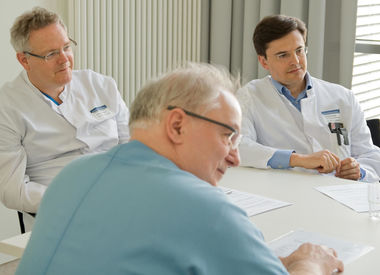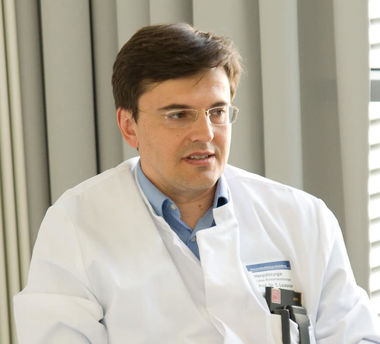“My son was given a second life”
Together with her son Daniel, Dina Gizatullina traveled to the Pediatric Heart Center at Heidelberg University Hospital from Russia. The 17-month-old boy suffers from a rare, life-threatening malformation of the trachea. We spoke to Dina Gizatullina and the treating physicians Prof. Matthias Gorenflo and Prof. Tsvetomir Loukanov about Daniel’s story and his stay in Heidelberg.

You traveled to Heidelberg for the treatment of your son Daniel who is now 17 months old. Yesterday, on April 9, 2015, Daniel could be released from the Pediatric Heart Center at Heidelberg University Hospital following his successful treatment. How are you and your son doing today?
Dina Gizatullina: We feel much better today than we did several months ago. It is still not an easy time, but I think that Daniel will now develop well after the long period of treatment.
When did you first notice that something is wrong with your son, and what were these anomalies or symptoms?
Gizatullina: I am a doctor myself, but I did not notice anything at first. At 6 months old, Daniel had severe bronchitis and at 10 months, he had to be treated for respiratory distress in the intensive care unit. This is where the diagnosis tracheal stenosis was made.

Professor Gorenflo, you are the Head of the Department of Pediatric Cardiology and attended to Daniel on your ward. Could you describe Daniel’s symptoms?
Prof. Matthias Gorenflo: Daniel has a so-called funnel trachea – funnel meaning chimney. As a result of cartilage rings, his trachea has been narrowed to approximately 30 percent of its regular size almost across its entire length. The reason is a genetic disorder, the VACTERL syndrome, in which various malformations develop. Daniel also has some other malformations, but the tracheal stenosis is his main issue.
What does the tracheal stenosis mean for Daniel?
Prof. Gorenflo: Triggered by increased mucus production in infections, Daniel had been suffering from such acute respiratory distress since November 2014 that he needed mechanical ventilation for some weeks. In January 2015, he was able to breathe on his own again. Eventually, however, the risk is extremely high that children suffering from this disease will die early due to complications.
Mrs. Gizatullina, you are from Kazan in Russia and traveled to Germany for Daniel’s treatment. How did this come about?
Gizatullina: This is a long story, and it was a real Odyssey...
Can you summarize the main stages?
Gizatullina: After we found out that there were no experts for this disease in Russia, we did a lot of research and contacted a clinic in Wiesbaden together with an acquainted physician. Unfortunately, we did not know then that there was a Center in Heidelberg specializing in this disease. In Wiesbaden, Daniel was treated in the first two months, and once he was doing better, rehabilitation was begun near Hamburg.
Prof. Tsvetomir Loukanov
How did you learn that the Pediatric Heart Center in Heidelberg specializes in the treatment of Daniel’s disease?
Gizatullina: Due to severe respiratory distress, Daniel had to be transferred to an intensive care unit in Hamburg again. I am very grateful that one of the physicians there found out where Daniel could be operated on and contacted Heidelberg.

Prof. Loukanov, you are the Head of the Division of Pediatric Cardiac Surgery at the Department of Cardiac Surgery in Heidelberg. You and your team rank among the few experts in Europe who are able to operate on tracheal stenoses. What is the particular difficulty in this treatment and which conditions are required?
Prof. Tsvetomir Loukanov: Owing to the around 30 years of experience in the treatment of tracheal stenoses at our Center, I have learned a lot from my predecessors Prof. Dr. Siegfried Hagl and Dr. Christian Sebening and would like to pass on the knowledge and the experience. We are experienced in performing this difficult and risky procedure. Thanks to the option of performing a tracheal bronchoscopy - an examination in the hands of Dr. Wolfgang Springer, Senior Consultant of cardiology - following the operation, our surgery results are instantly visible. The good cooperation with our cardiologists, the anesthesiologists and the Heidelberg Thoraxklinik is absolutely essential as well, in particular our colleague Prof. Hans Hoffmann, the Assistant Medical Director of the Thoraxklinik’s surgical department. In this way, we are able to link the benefits of tracheal surgery to the benefits of heart surgery and the application of the heart-lung machine. Competence is not depending on one individual expert.
Prof. Gorenflo, Daniel came to Heidelberg two months ago on February 11. Which condition was he in?
Prof. Gorenflo: Daniel had to receive inpatient treatment as he was under acute respiratory distress. He caught a mild viral infection again. We had to wait for Daniel’s condition to improve so that the surgery could be performed with the lowest risk possible.
Prof. Loukanov: ...whereby “low risk” is a rather positive phrasing...
Prof. Gorenflo: ...Yes but you certainly choose the best time you can get.
Prof. Loukanov, was the decision to perform surgery clear from the beginning?
Prof. Gorenflo, Dr. Springer, Prof. Loukanov
Prof. Loukanov: We did not make this decision lightly. Even for us, after having operated on over 80 cases in tracheal surgery here in Heidelberg, it was rather extensive. We met with Prof. Hoffmann, with Prof. Gorenflo and colleagues from anesthesiology and intensive care and decided in favor of surgery as we saw no alternative. Otherwise the situation would not have been stable much longer.
Mrs Gizatullina, did you feel well supported by the medical staff?
Gizatullina: Very well. The psychological support by the nurses and physicians and their positive attitude helped us. When your doctor bolsters you up by saying “It will be fine”, you feel very well supported. Moreover, we were very well informed by Prof. Gorenflo and his colleagues who answered our questions in detail.
How were you able to communicate with the staff?
Gizatullina: Sometimes, we communicated in English or in Russian, as some doctors speak Russian, and, if need be, even with gestures.
On March 17, Daniel could finally be operated on. How did you correct the stenosis?
Prof. Loukanov: It was not a routine surgery for us at all. An aggravating factor was the length of the stenosis and that the trachea had been enormously changed by prior ventilation. We used the heart-lung machine for ventilation and to support the heart. For the expansion, we performed a so-called slide tracheoplasty. This means that we reconstructed a new trachea exclusively from his own trachea tissue. Daniel now has a shorter but expanded trachea without any foreign material, which will grow with him in the future.
What is so risky about this procedure?
Prof. Loukanov: You can injure all sorts of things. For instance the nerves of the vocal chords or the diaphragm, this is a really sensitive area. We are also supported by our perfect technical equipment – no expenses are spared here.
How long does such a surgery take?
Prof. Loukanov: Ask the mother, she knows down to the last minute.
Gizatullina: It felt like an entire year... but it was 4 hours.
Prof. Loukanov: I know from my own experience how this is for parents. Therefore, it is my ritual in the OR that I call the parents as soon as I take my gloves off.
Daniel Tikhanov
Mrs Gizatullina, how did Daniel and you do in the three weeks after the surgery?
Gizatullina: I was glad when Daniel could be transferred from the intensive care unit to the regular ward after a few days, where he felt better. From there, things improved rapidly.
Prof. Gorenflo: This is understandable because Mrs. Gizatullina could spend the night with her son on the regular ward. This makes a difference for parents and for the children as well.
Prof. Gorenflo, will Daniel need to undergo further treatment after returning to Russia?
Prof. Gorenflo: He needs to have lung specialists and cardiologists look after him, for instance to check his lung function, check for infections or on growth.
Prof. Loukanov, how do you experience your work? Viewed from the outside, one might think that it must be very gratifying to be able to help children in such a life-threatening situation?
Prof. Loukanov: Yes, it is very heroic from the outside looking in. You expect a good result, lasting for 70, 80, 90 years. But an enormous amount of responsibility rests on the shoulders of a pediatric heart surgeon. Every day, you are burdened not only by the three or six kilograms the patient weighs but also the mother’s and father’s and the entire family’s worries who are all waiting to hear that it went well. We operate on almost 300 cases per year. Around 98 percent of the cases are going well but there are still two to three percent of patients in which serious complications occur or who even die. You do need a strong psyche.
Mrs Gizatullina, When would you like to travel home? Would you like to share something else with us that is important to you?
Gizatullina: On April 20, we have our last appointment at the hospital, and we are planning to fly back on April 27. As it is so beautiful here in Heidelberg, we will enjoy our time here and relax until then. In closing, I would like to express my gratitude to all doctors and the entire hospital, as my son was given a second life. I cannot describe in words how thankful I am, you can only feel it yourself. We have been waiting for this moment for months.
Many thanks for the interview.
The questions were asked by Kerstin Ammon.

